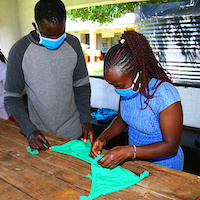Healthy HECA!
Today’s blog is about HECA, an acronym that stands for Healthy Environments for Children Alliance. It’s described (on the WHO site) as “a world-wide alliance to reduce environmental risks to children’s health that arise from the settings where they live, learn, play, and sometimes work, by providing knowledge, increasing political will, mobilizing resources, and catalysing intense and urgent action”. And HECA is (if you’ll pardon the pun) clearly in rude health in Londiani, as today’s blog from Emer Hurley of the Harambee team, makes clear…
The welcoming committee consisted of 20 smiling faces proudly sporting their yellow HECA club t-shirts while singing and clapping. It was a sign of the day to come as this colourful reception at the gates of Kedowa primary school was followed by a day of laughter, brainstorming and animated faces. Pauline (fellow Irish volunteer), Wilborn (public health officer), Caroline (FOLK staff member) and I were presented with gold and silver tinsel as we moved to the school’s main building to commence our refresher HECA day.
This school visit was a great follow-on from our trip to Tegunot primary school (where we introduced HECA to eager students and staff yesterday). It allowed me the opportunity to witness first-hand the impact of HECA on a school, its environment and, most importantly, its students. The clean latrines, well-kept flowerbeds and increased use of handwashing facilities were testament to the implementation of the HECA club’s initial action plan, devised in 2012.
The HECA committee, consisting of students ranging in age from seven to 16, took great pride in showing and telling us about the differences in the school since the introduction of HECA. They mentioned improved attendance due to healthier students, deworming, higher standards of cleanliness, and a healthier and happier school environment, to name but a few. And the students were not afraid to take on role playing to depict healthy and unhealthy habits – in fact they kept us thoroughly entertained with their performances!
Forming small groups to carry out a variety of tasks, the students took responsibility for carrying out an environmental review and identified problems in relation to the compound, the water, the latrines and the kitchen. Great teamwork and interaction between students, facilitators and staff led to the development of a new action plan outlining four key areas: problem, solution, person responsible and timeframe. The close of the day was as joyous as the start as we took pictures and videos and shared chai and mandazas in the headmistress’s office.

